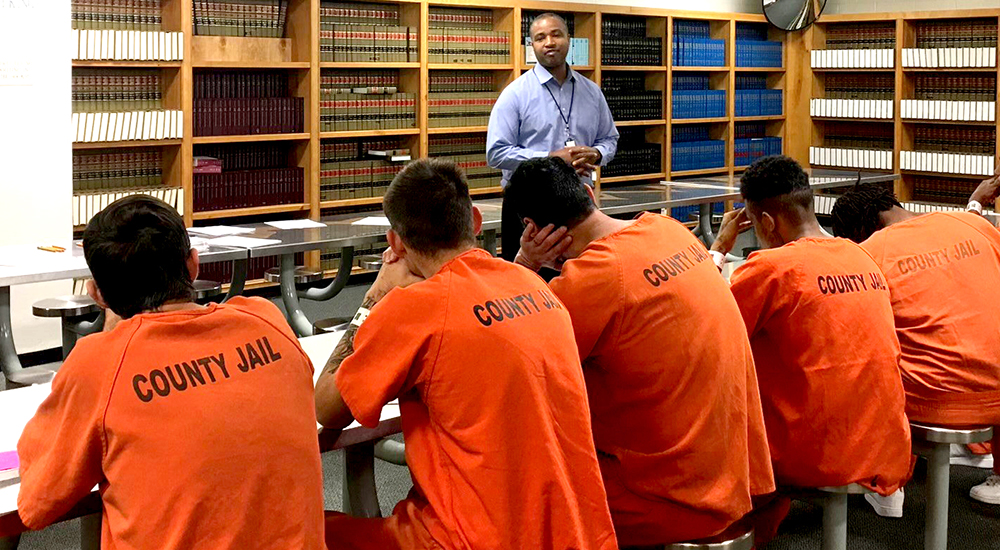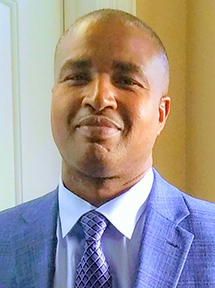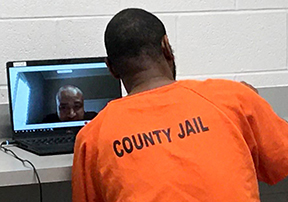VA’s Veterans Justice Program identifies justice-involved Veterans and offers them medical and mental health care, substance abuse treatment, housing and vocational rehabilitation services.
Henry Molden knew from an early age he wanted to work in the field of criminal justice. Growing up with a mother who was a nurse at a local prison, he would hear stories that would often pique his interest. Now, this Army Veteran is one of VA’s Veterans Justice outreach specialists at the Michael E. DeBakey VA Medical Center in Houston, Texas.
As a Veteran, Molden felt drawn to work with other Veterans and started at a VA Vet Center in 2007. At the five-year mark, he learned about a new Veterans Justice Outreach Program and applied for a position.
“At the time I learned about the job, I didn’t even know VA was trying to help these Veterans,” Molden said. He immediately knew this was what he was meant to do.
Veterans Justice outreach specialists are responsible for coordinating with local justice system partners on direct outreach, assessment and case management for justice-involved Veterans in local courts and jails.
Helps Veterans access VA services
“The work I’m doing now is like a dream job for me,” Molden said. “At the Vet Center, my focus area was working with incarcerated Veterans. The Veterans Justice Program had not been established so my Vet Center experience thoroughly prepared me for this position.”
The Veterans Justice Program identifies and works with helping justice-involved Veterans access VA services at the earliest possible opportunity. The program also builds and maintains partnerships between VA and the community’s criminal justice system.
As a member of the team building this new program, Molden played a significant role in developing innovative strategies to assist incarcerated Veterans. This included working to have jail officials send enrollment forms directly to the VA eligibility office to streamline the process. That ensures Veterans are enrolled with VA before they are released.
Many Veterans face an elevated risk of homelessness after release from jail or prison. To fix this problem, Molden works with VA transitional housing programs, VA residential treatments and VA contracted residential treatment programs before Veterans are released.
Know where they are going before release
“In the past, if you were going to be homeless when released, the jail officials would say, ‘Hey, take the number to the National Call Center for Homeless Veterans,’” Molden explained. “Now, we solve that issue before a Veteran gets out. The gold standard is for an individual to have a place and know where they’re going before they’re released.”
Molden has spent countless hours educating and assisting Veterans with their VA benefits, coordinating assistance in jail, such as medications, mental health treatment and substance abuse counseling.
He coordinates with attorneys to redirect Veterans from jail to VA residential treatment programs and VA contracted programs, and connects Veterans with Veteran Readiness and Employment (VR&E).
Helping Veterans create a Community Re-entry Plan with goals, objectives and solutions to barriers are critical elements of the process.
“Helped me get through roughest time of my life”
“I had one Veteran incarcerated in the Harris County Jail, and [I] worked with him for about five months. He memorized my telephone number just as many others have done,” Molden said. “This guy served five years. When he got out, he called me to thank me. He said the information I gave him helped him have a seamless transition coming out of prison.”
Now receiving VA medical and mental health care, this Veteran is also enrolled in the VA housing program and working in VR&E.
“Just to be a part of such success stories and to have someone calling you and say, ‘Thanks. The information and support you gave me really made the difference. It helped me get through one of the roughest times of my life,’” Molden continued. “That feels amazing and to see him now on the right track shows what a difference we all can make.”
For more information, visit www.va.gov/homeless/vjo.asp.
Topics in this story
More Stories
Watch the Under Secretary for Health and a panel of experts discuss VA Health Connect tele-emergency care.
The 2024 National Veteran Suicide Prevention Annual Report provides the foundation for VA’s suicide prevention programs and initiatives.
Theranostics is a specialized field of nuclear medicine that uses a two-pronged approach to diagnose and treat cancer.









Im an US Army veteran and was incarcerated in 2011 for self defense is there anything able to be done to get this felony off my record
Hello this is an amazing story and I am 100 percent disabled veteran that would like to help other veterans that need help. How can I cannot Mr. Molden?
Sir – as a matter of personal experience working Level 4 confinement ministry at Limon here in Colorado, our team saw nothing but benign neglect. That persisted despite the growing number of former service men suffering bodily injuries and PTSD, with the latter in our opinion being a definite contributing factor to their incarceration.
If a focused training program exists its a stealth one in Colorado.
Great job, Mr. Moldon! I have a neighbor who directly benefitted from a program like yours. He has a nice house, a good job, and is a very good neighbor. I think he went through a special Veteran’s Court, which considers the impact of service-connected mental health problems and addictions when rendering judgement.